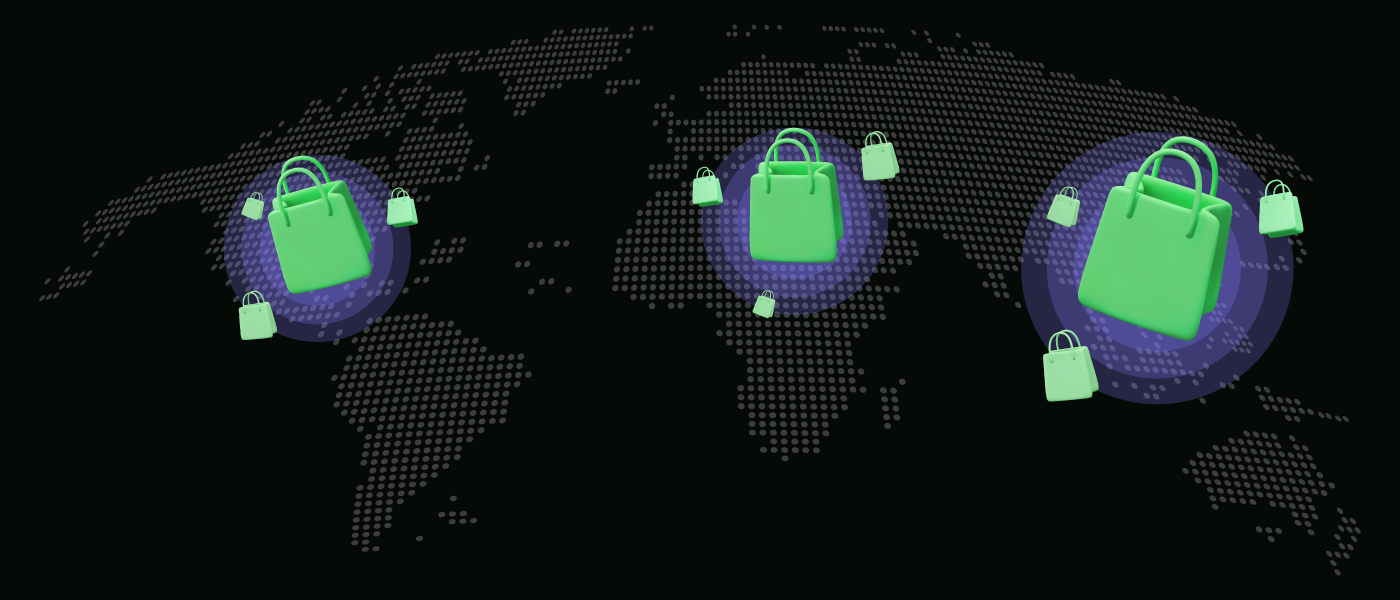Hey there, e-commerce explorer! Looking to dive into the Malaysian e-commerce market? You’re in the right place. We’ve crafted this guide just for you – no jargon, no fuss, just the juicy bits you need to conquer cross-border selling in Malaysia.
In this guide, we’re spilling the beans on everything you need to know. We’ll unravel the nitty-gritty of localisation in Malaysia, wrap our heads around import regulations, and crunch the numbers on logistics costs. So, let’s buckle up and get ready to make some waves in the Malaysian e-commerce market!
Ready to rock? Let’s go! 🚀
Introduction to Malaysian E-commerce Landscape
Key Stats You Need to Know
Let’s kick off by acquiring a ground reality of Malaysia’s bustling e-commerce landscape:
- Population: Boasting a population of over 32 million (2022), Malaysia offers a substantial consumer base for your cross-border e-commerce venture.
- GDP: With a growing economy, Malaysia’s Gross Domestic Product (GDP) reached approximately 380 billion USD (2022).
- GDP per Capita: The GDP per capita stands at around 11,852 USD (2022), showcasing the country’s increasing purchasing power.
- Internet Penetration: Around 80% of Malaysians are connected to the internet (2022), indicating a thriving online community.
- E-commerce Users: Approximately 40% of the population actively engages in online shopping (2022), highlighting the substantial e-commerce potential.
E-commerce Categories that Shine
When it comes to e-commerce in Malaysia, certain categories reign supreme among online shoppers:
- Electronics and Gadgets: Malaysians have a strong affinity for the latest gadgets and electronics, making this category a prominent player.
- Fashion and Apparel: Like many nations, fashion remains a top contender in Malaysia’s e-commerce landscape, with a significant share of consumer spending.
- Beauty and Personal Care: Beauty products and personal care items capture a dedicated audience of online shoppers seeking convenience and variety.
Payment Methods
Understanding payment preferences is crucial for a successful cross-border e-commerce venture in Malaysia:
- Credit and Debit Cards: Card payments are widely used, making it essential to offer secure and seamless card payment options.
- Online Banking: Malaysians frequently opt for online banking methods for their transactions, emphasising the importance of integrating this option.
- E-wallets: Digital wallets like GrabPay and Touch ‘n Go eWallet are gaining traction, offering a convenient and efficient payment method.
Language and Currency
- Language: Bahasa Malaysia, commonly known as Malay, serves as the official language, ensuring smooth communication with your Malaysian customers.
- Currency: The Malaysian Ringgit (MYR) is the official currency, and pricing your products in MYR provides clarity and ease of transactions.
The Top 10 Malaysia E-commerce Platforms for 2025
The Malaysias e-commerce market is expanding rapidly, at CAGR of 14.32%. By the end of 2024, it is expected to…
Understanding Landed Costs and Import Rules in Malaysia
When it comes to successful cross-border e-commerce in Malaysia, understanding the intricacies of landed costs and import regulations is essential. Let’s delve into the crucial components that make up landed costs and the rules that govern importing goods into Malaysia.
Landed Costs Explanation
Landed cost is the comprehensive sum of expenses associated with importing goods into Malaysia. This includes various factors that add up to the final cost of your products reaching the Malaysian market. Here’s what you need to consider:
- Product Price: The initial cost of your goods.
- Shipping: The fees for transporting your products to Malaysia.
- Duties: Taxes levied on imports as they cross the borders.
- Taxes: Additional taxes, such as Value Added Tax (VAT) or Goods and Services Tax (GST), applied to imported goods.
- Fees: Extra charges like currency conversion fees and handling charges.
The Valuation Methods
Determining the accurate value of your goods is crucial for calculating duties and taxes correctly. There are different valuation methods that customs authorities use, and it’s important to be aware of these methods when importing into Malaysia. These methods may include:
- Transaction Value Method: This involves using the actual transaction price paid or payable for the imported goods.
- Transaction Value of Identical Goods: When identical goods are sold for export to Malaysia at the same time as the goods being valued.
- Transaction Value of Similar Goods: Similar to the method above, but involving similar goods rather than identical ones.
- Deductive Value Method: This involves deducting certain costs from the resale price of the goods.
- Computed Value Method: This method considers production costs, profits, and other expenses to arrive at the customs value.
De Minimis, Tax, and Duty in Malaysia
In addition to the various valuation methods used for calculating duties and taxes on imported goods, Malaysia also implements a de minimis threshold that significantly impacts the taxation of shipments entering the country. This threshold dictates the minimum value of shipments below which fewer or no taxes are charged. For cross-border e-commerce in Malaysia, understanding this threshold is crucial for accurate cost calculations and pricing strategies.
De Minimis Threshold in Malaysia
As of the latest information available, Malaysia’s de minimis threshold stands at MYR 500, which is approximately USD 115. This threshold considers both the value of the shipped goods and the associated shipping fees. If the combined value, known as the Cost, Insurance, and Freight (CIF) value, of your shipment surpasses MYR 500, certain taxes and duties will be applicable.
Tax and Duty Applicability
For shipments exceeding the MYR 500 de minimis threshold, import duties and taxes will be levied. The rates for these charges vary based on the value of the shipment and the type of tax:
- Import Duties: The range of import duties for such shipments is between 0% to 25%, depending on the nature of the goods.
- Sales & Services Tax (SST): SST is applied to the CIF value and can fall within the range of 5% to 10%. The standard rate for SST is 10%, while a reduced rate of 5% is also applicable for certain goods.
It’s important to note that these charges are calculated based on the CIF value, which includes the value of the goods, shipping fees, and insurance fees. Therefore, accurate documentation and transparent reporting of these values are essential to ensure compliance with Malaysian import regulations.
Understanding and adhering to Malaysia’s de minimis threshold and associated tax rates is fundamental for planning your cross-border e-commerce strategy. By staying informed about these regulations, you can accurately calculate your landed costs, determine your pricing strategy, and successfully navigate the import process in Malaysia.
Landed Cost Examples
Let’s dive into practical examples that illustrate how to calculate landed costs for various scenarios. These examples will shed light on the process of determining the total expenses associated with importing goods into Malaysia.
Example 1: Small Electronic Gadgets
- Product: Smartwatches
- Product Value: USD 200
- Shipping Cost: USD 30
- Insurance Cost: USD 10
- Import Duties Rate: 10%
- SST Rate: 10%
Calculation:
Total CIF Value = Product Value + Shipping Cost + Insurance Cost
Total CIF Value = USD 200 + USD 30 + USD 10 = USD 240
Import Duties = Total CIF Value × Import Duties Rate
Import Duties = USD 240 × 0.10 = USD 24
SST = Total CIF Value × SST Rate
SST = USD 240 × 0.10 = USD 24
Total Landed Cost = Total CIF Value + Import Duties + SST
Total Landed Cost = USD 240 + USD 24 + USD 24 = USD 288
Example 2: Fashion Apparel
- Product: Dresses
- Product Value: MYR 300 (approximately USD 69)
- Shipping Cost: MYR 50 (approximately USD 12)
- Insurance Cost: MYR 10 (approximately USD 2.30)
- Import Duties Rate: 5%
- SST Rate: 10%
Calculation:
Total CIF Value = Product Value + Shipping Cost + Insurance Cost
Total CIF Value = USD 69 + USD 12 + USD 2.30 = USD 83.30
Import Duties = Total CIF Value × Import Duties Rate
Import Duties = USD 83.30 × 0.05 = USD 4.17
SST = Total CIF Value × SST Rate
SST = USD 83.30 × 0.10 = USD 8.33
Total Landed Cost = Total CIF Value + Import Duties + SST
Total Landed Cost = USD 83.30 + USD 4.17 + USD 8.33 = USD 95.80
These examples demonstrate the step-by-step calculation of landed costs for different product scenarios. By factoring in product value, shipping costs, insurance fees, import duties, and SST, you can accurately determine the total expenses associated with bringing your goods into Malaysia.
How To Use Shopee Live Selling To Maximize Sales
Shopee Live, a livestream marketing feature, has become a game-changer, revolutionizing how e-commerce sellers connect with their audience. This interactive…
Leveraging Malaysian Trade Agreements
Malaysia’s involvement in various trade agreements can offer significant advantages to cross-border e-commerce businesses. These agreements aim to promote trade, reduce barriers, and create opportunities for smoother import and export processes. Let’s take a closer look at some key trade agreements involving Malaysia and how they can benefit your e-commerce endeavours:
ASEAN Free Trade Area (AFTA)
Malaysia is a proud member of the Association of Southeast Asian Nations (ASEAN), a regional bloc comprising ten countries. The ASEAN Free Trade Area (AFTA) was established to foster economic integration among member nations. Under AFTA, import duties on qualifying goods traded within ASEAN member countries are progressively reduced or eliminated. This initiative facilitates the free flow of goods and encourages cross-border trade within these region.
Comprehensive and Progressive Agreement for Trans-Pacific Partnership (CPTPP)
The Comprehensive and Progressive Agreement for Trans-Pacific Partnership (CPTPP) involves 11 countries, including Malaysia. The agreement aims to establish a free trade area in the Asia-Pacific region, promoting economic integration and cooperation. The CPTPP reduces trade barriers, such as tariffs and import quotas, creating favourable conditions for cross-border trade. By being part of the CPTPP, Malaysia enhances its trade relationships and offers improved market access for businesses engaged in e-commerce.
Malaysia-Australia Free Trade Agreement (MAFTA)
The Malaysia-Australia Free Trade Agreement (MAFTA) is a bilateral agreement between Malaysia and Australia. This agreement aims to boost trade and economic cooperation between the two nations. Under MAFTA, import duties on various goods are either reduced or eliminated, depending on the nature of the products. This agreement opens doors for Australian businesses looking to expand their cross-border e-commerce presence in Malaysia and vice versa.
Navigating Customs Procedures
Customs procedures play a pivotal role in facilitating international trade while ensuring compliance with regulations and security measures. As an e-commerce business venturing into Malaysia, it’s essential to understand the customs procedures that govern the import and export of goods:
Role of Customs Authorities
Malaysian customs authorities oversee the enforcement of import and export regulations. Their responsibilities include inspecting shipments, verifying documentation, assessing duties and taxes, and ensuring the lawful movement of goods. Partnering with reputable customs brokers and e-commerce logistics providers in Malaysia can streamline the customs clearance process and help you navigate the complexities of cross-border trade.
Documentation Essentials
Accurate and complete documentation is fundamental for successful customs clearance. Ensure that you provide the following essential documents:
- Commercial Invoice: A detailed invoice that specifies the value, quantity, and nature of the goods being imported.
- Packing List: A document that lists the contents of each package in the shipment, aiding customs officers during inspection.
- Certificate of Origin: A document that certifies the country of origin of the goods, which can impact the eligibility for trade agreements and preferential tariffs.
- Import Permits and Licenses: Certain goods require permits or licenses for importation. Obtain the necessary permits to avoid delays and complications.
- Bill of Lading or Airway Bill: A transportation document that serves as evidence of the contract of carriage between the shipper and the carrier.
- Declaration of Value: A statement that declares the value of the imported goods for customs purposes.
Import Restrictions and Regulations in Malaysia
When engaging in cross-border e-commerce in Malaysia, it’s vital to be aware of import restrictions and regulations that govern the entry of specific goods into the country:
Different Import Categories
Malaysia categorises imports into various categories, each subject to distinct regulations:
- Prohibited Imports: These are items strictly prohibited from entering Malaysia, including illegal drugs, counterfeit goods, and offensive materials.
- Restricted Imports: Restricted items require permits, licenses, or approval from relevant authorities for importation. Examples include firearms, pharmaceuticals, and certain chemicals.
- Controlled Imports: Controlled items are subject to specific conditions and requirements. These may include items related to wildlife conservation, hazardous materials, and cultural artefacts.
Examples of Prohibited Items
Malaysia’s regulations prohibit the importation of certain items, including:
- Illegal Drugs and Narcotics
- Counterfeit Currency
- Pornographic Materials
- Weapons and Explosives
- Certain Agricultural Products
Biosecurity and Agriculture Measures
Malaysia places a strong emphasis on protecting its environment, agriculture, and biodiversity. Therefore, strict biosecurity measures are in place to prevent the introduction of pests and diseases. When importing plant-based products, agricultural goods, or live animals, you may be required to obtain permits, undergo inspections, and adhere to specific regulations to ensure compliance with biosecurity measures.
Legal and Regulatory Requirements for Setting Up an E-commerce Business in Malaysia
As Malaysia emerges as the 33rd largest market for e-commerce, the potential for growth in the digital landscape is undeniable….
Shipping Logistics and Compliance for E-commerce Importing in Malaysia
Efficient shipping logistics and compliance are essential for a successful cross-border e-commerce venture in Malaysia. Consider the following factors to ensure a smooth and compliant shipping process:
Reliable Courier Services
Partner with reputable courier services that specialise in international logistics. Look for carriers with a proven track record of reliable deliveries, real-time tracking, and secure handling of packages. Reputable couriers can help you meet delivery deadlines and maintain a positive customer experience.
Additional Shipping Fees
While shipping costs are a significant consideration, there could be potential additional fees that may apply:
- Tracking Fees: Some courier services offer tracking options for an additional fee. Providing tracking information to your customers enhances transparency and trust.
- Insurance Fees: Consider insuring high-value shipments to protect against loss or damage during transit.
- Fuel Surcharges: Fluctuating fuel prices can result in fuel surcharges added to shipping costs. Keep this in mind when calculating your shipping expenses.
Documentation Requirements
Accurate documentation is essential for customs clearance and compliance with regulations. Ensure that you have the necessary documentation ready for each shipment:
- Commercial Invoices: Detailed invoices that provide information about the goods, their value, and their origin.
- Packing Lists: Lists of the contents of each package, aiding customs officers during inspections.
- Certificates of Origin: Documents certifying the origin of the goods, which can impact tariff rates and eligibility for trade agreements.
- Shipping Labels: Labels that include essential shipment details, such as tracking numbers and delivery addresses.
By understanding and effectively navigating these customs procedures, import regulations, and logistics considerations, you’ll position your cross-border e-commerce business for success in the vibrant Malaysian market. Your attention to detail, compliance with regulations, and commitment to customer satisfaction will set the stage for smooth operations and a thriving online presence. This is where a comprehensive logistics partner like Locad can step in.
The Recipe for Growth: How Same-Day Fulfillment by Locad is Helping Cosmic Cookware Grow
Cosmic Cookware is a kitchen companion brand that creates pans and accessories that not only look good, but cook good….
Introducing Locad: Your Comprehensive Logistics and Fulfillment Partner in Malaysia
Locad specialises in providing end-to-end logistics and fulfillment solutions for e-commerce businesses, helping you streamline your logistics operations and enhance customer satisfaction. Here’s how partnering with Locad can benefit your cross-border e-commerce venture:
- Warehousing Solutions: Locad offers strategically located warehouses that enable you to store your products closer to your customers. This reduces shipping times and costs, resulting in faster deliveries and happier customers.
- Order Fulfillment: Locad’s advanced order fulfillment technology automates the picking, packing, and shipping process. This ensures accurate and efficient order processing, reducing errors and delays.
- Shipping Expertise: With experience in global shipping, Locad can help you choose the best shipping methods, carriers, and routes for your shipments to Malaysia. This ensures cost-effective and reliable deliveries.
- Technology Integration: Locad’s technology integrates seamlessly with your e-commerce platforms like Shopify, WooCommerce, Shopee, Lazada & TikTok, allowing for real-time inventory updates, order tracking, and transparent reporting.
- Customs Clearance: Locad is well-versed in customs procedures and can assist with proper documentation and compliance, ensuring that your shipments clear customs smoothly.
- Cost Savings: By optimising shipping routes, reducing shipping distances, and minimising errors, Locad can help you save on shipping costs and improve your profit margins.
Wrap up your cross-border e-commerce journey by partnering with Locad – your all-in-one logistics and fulfillment solution in Malaysia. With Locad by your side, you’ll easily navigate the intricacies of shipping logistics, compliance, and regulations, allowing you to focus on what you do best – growing your business and making waves in the Malaysian e-commerce wonderland! Ready to take your cross-border e-commerce venture to new heights? Let’s get started with Locad today.














